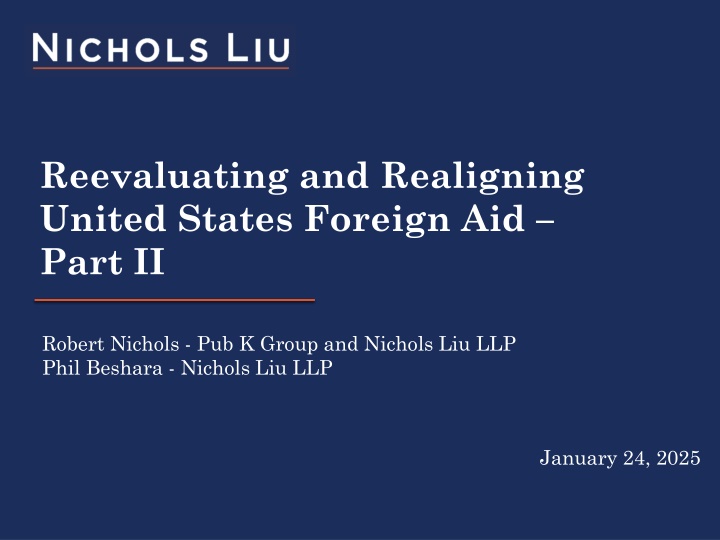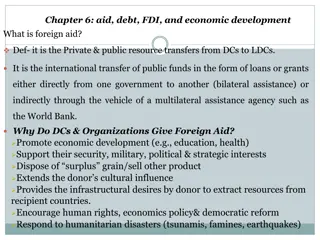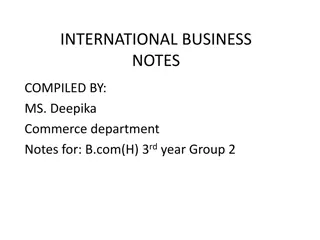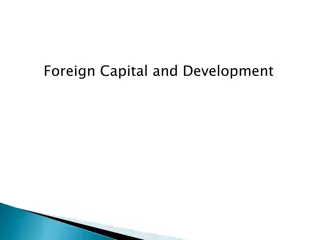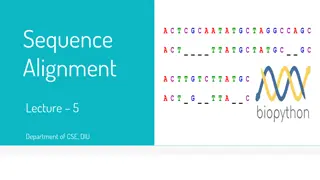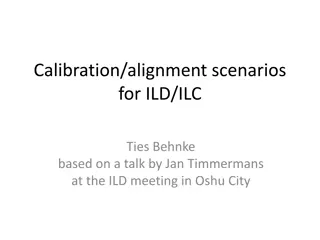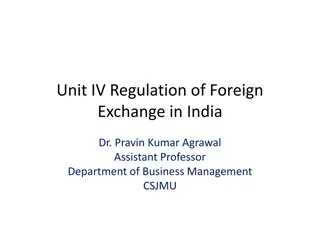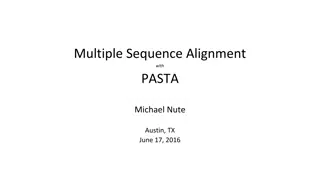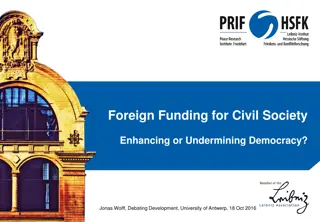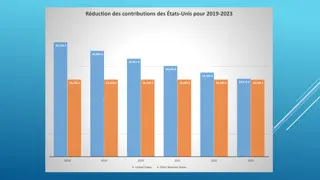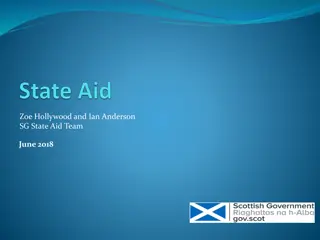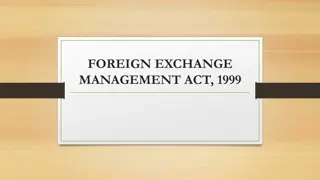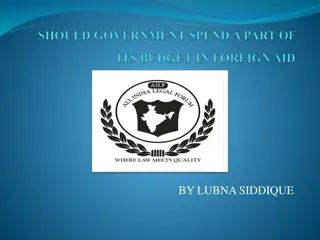Reevaluating United States Foreign Aid for Alignment
This document discusses an executive order reevaluating and realigning United States foreign aid to ensure alignment with American interests. It outlines determinations, resumptions, and approval requirements for foreign assistance programs. The Secretary of State's message to missions emphasizes the need for authorization and approvals in line with the President's agenda for foreign aid. Existing foreign assistance awards are also addressed regarding new disbursements and legal rights.
Download Presentation

Please find below an Image/Link to download the presentation.
The content on the website is provided AS IS for your information and personal use only. It may not be sold, licensed, or shared on other websites without obtaining consent from the author.If you encounter any issues during the download, it is possible that the publisher has removed the file from their server.
You are allowed to download the files provided on this website for personal or commercial use, subject to the condition that they are used lawfully. All files are the property of their respective owners.
The content on the website is provided AS IS for your information and personal use only. It may not be sold, licensed, or shared on other websites without obtaining consent from the author.
E N D
Presentation Transcript
Reevaluating and Realigning United States Foreign Aid Part II Robert Nichols - Pub K Group and Nichols Liu LLP Phil Beshara - Nichols Liu LLP January 24, 2025
Executive Order Reevaluating and Realigning United States Foreign Aid Misalignment: The EO characterizes the current U.S. foreign aid industry and bureaucracy as misaligned with American interests and often promoting ideas in foreign countries that destabilize peace. Determinations and Resumptions: It states that within 90 days, the responsible heads must determine whether to continue, modify, or cease each foreign assistance program. The funding can resume earlier, in the same or modified form, if a review is completed, and the program is deemed consistent with U.S. foreign policy. Approval Requirement: Any new foreign assistance programs and obligations must have approval from the Secretary of State or his designee, in consultation with the Director of OMB. 2
SECSTATE Message to Missions In keeping with one voice of American foreign policy, the United States government, through any department, agency or entity, shall not provide foreign assistance funded by or through the Department and USAID without the Secretary of State s authorization or the authorization of his designee. To the maximum extent permitted by law, no new obligations shall be made for foreign assistance until such time as the Secretary shall determine, following a review. No new funding obligations for new awards or extensions of existing awards until each proposed new award or extension has been reviewed and approved by F as consistent with the President Trump s agenda. 3
SECSTATE Message to Missions New Foreign Assistance Awards Until the review is completed and approvals are issued as consistent with the President s policy no new solicitations for contracts, grants or cooperative agreements no review of proposals for new awards 4
SECSTATE Message to Missions Existing Foreign Assistance Awards Contracting officers and grant officers shall immediately issue stop-work orders, consistent with the terms of the relevant award, until such time as the Secretary shall determine, following a review. No further funding obligated to awards and contracts or indefinite delivery /indefinite quantity (IDIQ) contracts. Decisions whether to continue, modify, or terminate programs will be made following this review. 5
Existing Awards: New Disbursements Legal Rights: Grants and Cooperative Agreements Assistance agreements are not legal obligations of the government. No right to funds: funds may be cut off at any time, and there is no enforcement mechanism like the Contract Disputes Act. According to 2 CFR 340, (Termination) awards can be terminated if they no longer align with program goals or agency priorities. No Stop Work Orders are issued under assistance awards. 6
Existing Awards: New Disbursements Legal Rights: Contractors Contracts are a legal obligation for the government to pay costs. Not paying costs is a breach of the contract. Contracts contain a subject to the availability of funds clause. This reflects the Anti-Deficiency Act, whereby funds cannot be obligated or expended unless there are available appropriated funds. Subject to availability of funds clause is not an excuse not to pay costs so long as appropriated funds remain available. Cherokee Nation of Okla. v. Leavitt (2005). But Contracting Officers may understand Anti-Deficiency Act or may fear retribution if they make payments. Possible need to enforce through Contract Disputes Act process. Subject to stop work orders and terminations for convenience. 7
Existing Awards: Stop Work and Terminations Stop Work Orders COs are issuing Stop Work orders that outline expected parameters of the stoppage and the treatment of costs. According to FAR clause 52.242-15, contractors must immediately comply and minimize costs during the work stoppage. Stop Work Orders typically last 90 days and can be extended or converted to a termination for convenience under these circumstances. It is difficult to jam on the brakes on a USAID contract. Contractors usually manage regular payments (rent, utilities, etc.) that cannot be readily stopped and must comply with local labor laws requiring advance notices for layoffs. Contractors should make sure there's an understanding with the CO on how to treat these types of costs at the onset. 90-day Stop Work Orders impact cash flow and covering indirect costs, causing uncertainty in ongoing and planned activities. Terminations for Convenience Contractors should position themselves to recover all costs and associated fixed fee (short of anticipated profit). 8
SECSTATE Message to Missions Waivers Available for: foreign military financing for Israel and Egypt emergency food assistance legitimate expenses incurred prior to today under existing awards or legitimate expenses associated with stop-work orders exceptions to the pause approved by the Director of Foreign Assistance. 9
Program Review Process Requires mission to produce to F for review a list of all active, pending, or proposed grants, subcontracts, contracts, or subcontracts, and provide a clear and concise statement explaining if and how the current or proposed use of obligated funds advances President Trump s policy. Describes creating: a process for collecting information from missions to enable determinations of whether the foreign assistance policies and interests supported by appropriations are not duplicated, are effective, and are consistent with President Trump s foreign policy, and a process for State s Director of the Office of Foreign Assistance (F) and the Office of Budget and Planning (BP) to work with the Office of Management and Budget (OMB) in making those determination, and review standards for making those determinations. The review is to be completed within 85 days and reported out to the President. 10
Program Review Criteria? Not yet set industry has opportunity to advocate Alignment with Foreign Policy o USAID is a tool of foreign policy/national security: funding and program proposals are reviewed by the Directorate of Foreign Assistance at State o Rubio s 3 questions tied closely to foreign policy objectives: Does it make us safer, stronger, and more prosperous? Efficiency Not clear at this point Innovation will be prioritized Localization may be a consideration as its seen as a more efficient use of development dollars Faith-based organizations with presence in-country are also being prioritized Private sector engagement will also be a theme A more accountable relationship with PIOs The aid industrial complex is a target of reform given its high overhead and the intent to diversify the partner base. o o o o o o o 11
Programs Likely at Risk Likely Targets Climate activities Women empowerment programs Gender programs Countries with limited strategic value (no strategic minerals, petroleum, ISIS presence, etc.), yet many programs are driven by strong lobbying by diaspora groups (Armenia, Bangladesh, etc.) Humanitarian Assistance o Not part of this EO review at this point o Project 2025 has its sights on long-term funding of humanitarian disasters and UN-funding that have grown over the years Localization o Consideration in terms of efficiency, relative to the larger contractor, grantee model. o Localization activities through subawards will depend on the continuation of the program. The review may entail modifications to heighten the role of local partners. o Balancing localization with risk of not receiving value and non-compliance will remain a concern o o o o 12
Our Efforts Advise on rights and obligations Stop work orders Terminations for convenience Shaping the review process Gaining insight on the process Shape the process Shape the review standards Helping clients justify their programs 13
Our Efforts Possible litigation Impoundment Control Act The Constitution assigns to Congress the power to control the government s purse strings. This is perhaps the most important single curb in the Constitution on Presidential power. Congress implements its power through the annual budget and appropriations process and through a series of permanent statutes that establish controls on the use of appropriated funds. This legal framework is designed to combat abuses by the Executive Branch. Impoundment is any Executive action or inaction that temporarily or permanently withholds, delays, or precludes the obligation or expenditure of budgetary resources. With the ICA, Congress limited the President s ability to NOT spend appropriations as enacted. Possible private right of action by contractors and NGOs to enforce. GAG Order Threats against contractors and NGOs Six decades ago, this Court held that a government entity s threat of invoking legal sanctions and other means of coercion against a third party to achieve the suppression of disfavored speech violates the First Amendment. Bantam Books, Inc. v. Sullivan, 372 U.S. 58, 67 (1963). Today, the Court reaffirms what it said then: Government officials cannot attempt to coerce private parties in order to punish or suppress views that the government disfavors. National Rifle Association of America v. Vullo, 602 U.S. ___ (2024) 14
Questions? Rnichols@nicholsliu.com 15
